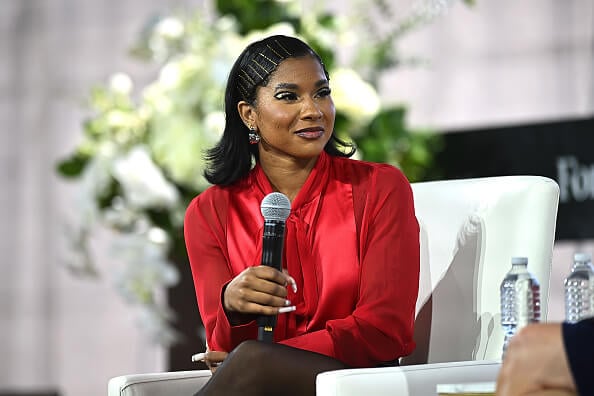US gymnast Jordan Chiles says ‘the person I am’ was taken from her during Olympic medal controversy
3 min read

Jordan Chiles, the U.S. gymnast who found herself at the center of a major Olympic controversy, has spoken candidly about the profound impact the dispute over her bronze medal had on her sense of identity. In an emotional appearance at the Forbes Power Women’s Summit on Wednesday, Chiles revealed how the controversy surrounding her performance in the women’s artistic floor exercise at the 2024 Paris Olympics affected her deeply, stating that it stripped her of “the person I am.”
The drama unfolded after Chiles initially secured a bronze medal in the women’s floor exercise. However, the Romanian gymnastics team contested the decision, leading the Court of Arbitration for Sport (CAS) to review and ultimately uphold the challenge. As a result, Chiles’ medal was reallocated to Romania’s Ana Bǎrbosu.
Reflecting on the experience, Chiles expressed that the loss extended beyond the physical medal. “The biggest thing that was taken from me was the recognition of who I was. Not just my sport, but the person I am,” she said, her voice breaking with emotion. The audience responded with a supportive round of applause as she gathered her thoughts. Chiles added that the controversy felt like a racial issue, intertwining with her past struggles and leaving her feeling “stripped” and “left in the dark.”
The gymnast drew parallels between her current situation and her earlier experiences with an abusive coach in 2018. Chiles had previously discussed the emotional and verbal abuse she endured from this coach, describing how it led her to question her love for gymnastics. The mistreatment included derogatory comments about her body, such as being called “fat” and likened to a “donut.” These experiences had a severe impact on her mental health, and the recent Olympic controversy reawakened those painful memories.
Chiles had shared her struggles with the coach on the “Peace of Mind with Taraji” show in 2021, explaining how the coach’s comments had triggered her eating habits and led to a mental struggle between her passion for the sport and the harsh criticism she faced.
The controversy over the bronze medal began after Chiles’ coaches successfully challenged her initial placement, which had put her in fifth place. Her historic bronze win, alongside Simone Biles and Rebeca Andrade, marked the first time that all three Olympic podium positions were occupied by Black women. A memorable moment of sportsmanship saw Chiles and Biles bowing playfully to Andrade, which was captured in a historic photo.
However, the Romanian Gymnastics Federation filed an official challenge to the revised results, arguing that the U.S. team’s challenge was submitted four seconds past the allowed one-minute window. CAS upheld this challenge, leading to Bǎrbosu being awarded the bronze.
In response to the decision, both the U.S. Olympic & Paralympic Committee (USOPC) and USA Gymnastics (USAG) announced their intention to appeal. They also claimed that CAS had initially sent important communications to incorrect email addresses, hampering their ability to prepare adequately for the hearing.
Chiles voiced frustration with the process, saying, “No one was listening to the fact that there are things that we have in place… They wanted it all to be about the Olympics and this and that.” She emphasized that the issue was more than just a medal but about recognition and fairness. “I followed the rules. My coach followed the rules. We did everything that was totally, completely right. So having been left in the dark is something that I feel like they took that all away and were trying to put the name ‘gymnastics’ in front of it,” Chiles asserted.
USAG also raised concerns about Dr. Hamid G. Gharavi, who chaired the CAS panel and has previously represented Romania in arbitration cases. While CAS stated that no objections to Gharavi’s appointment were raised by the involved parties, USAG claimed that they were not informed of his previous ties to Romania.
The ongoing fallout from this controversy highlights the complex interplay of personal, professional, and institutional factors that impact athletes at the highest levels of competition. For Chiles, the experience has been a challenging reminder of the obstacles that can affect even the most dedicated and accomplished athletes.